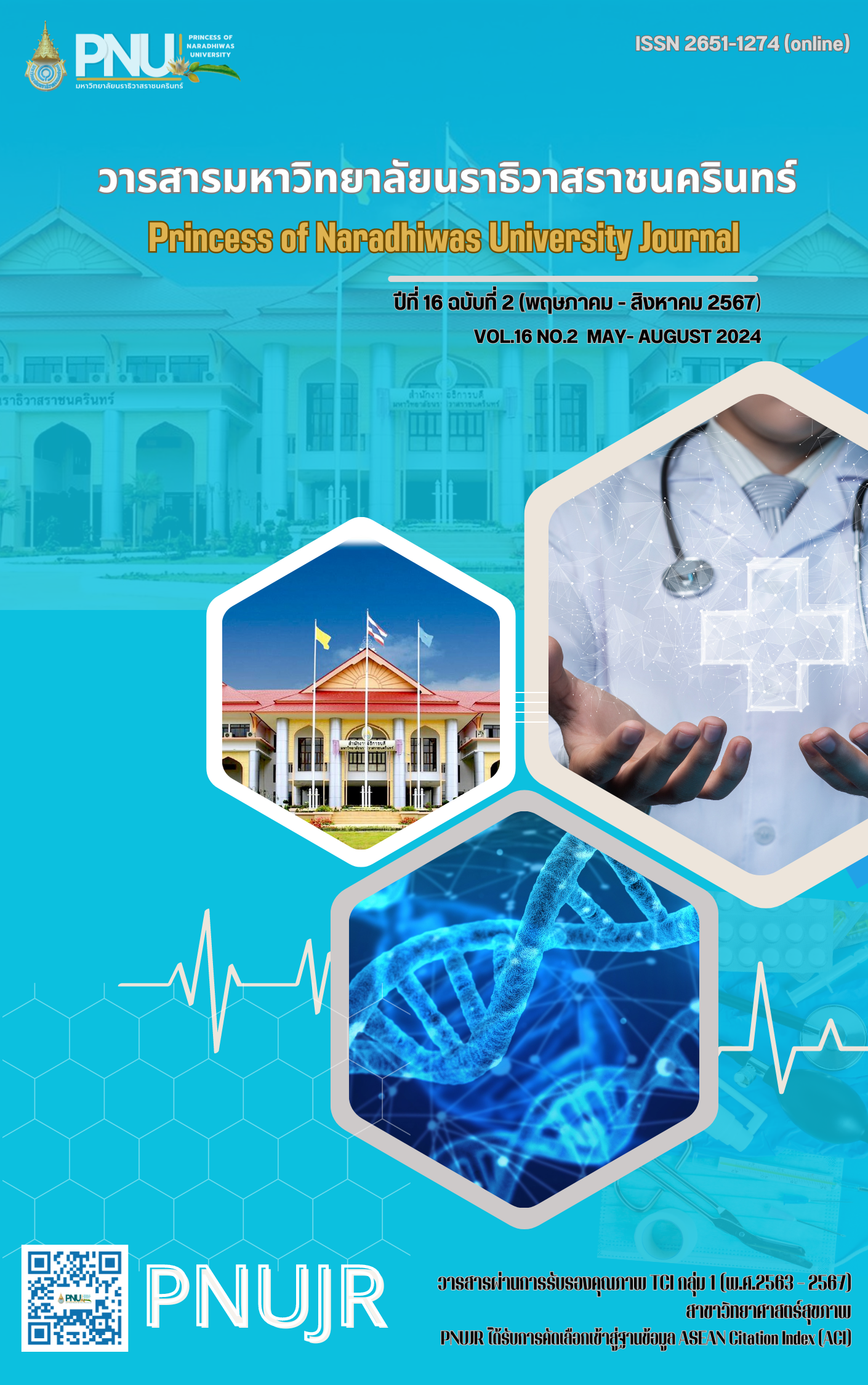Effectiveness of Online Health Literacy Promotion Program on Health Literacy and COVID-19 Preventive Behavior in Nursing Students, Mahasarakham University
Siranee Intaranongpai
Keywords:
: Health literacy, COVID-19 prevention, Online program, Nursing studentsAbstract
The purpose of the one group pre-test post-test quasi-experimental design was to compare health literacy and COVID-19 preventive behavior among nursing students, Mahasarakham University. 137 third- and fourth-year nursing students who registered for and enrolled in the nursing practicum in the semester of 2022 were selected using purposeful sampling. The research instruments were validated by three experts consisted of: 1) the health literacy promotion program, 2) the booklet and media, 3) the health literacy in the COVID-19 preventive questionnaire, and 4) the COVID-19 preventive behavior questionnaire. The instruments showed the item objective congruence index ranged from 0.67 to 1.00, content validity index ranged from 0.71 to 0.96, and Cronbach’ s alpha coefficient yielded values of 0.76 and 0.91, respectively. Data analysis used descriptive statistics and paired t-test.
The results found that the average health literacy scores of participants after participating in the program were higher than before participating the program (t = -9.060 , p < 0.001), and the average COVID-19 preventive behavior scores of participants after participating in the program were higher than before participating the program(t = -3.740 , p < 0.001).
The findings suggest that an online health literacy promotion program can improve health literacy in the context of COVID-19 prevention. This program has benefits. Prior to students practicing in nursing practicum, this program ought to be promoted to nursing students. It should also be extended to other health care fields where practicing with patients is necessary for appropriate COVID-19 preventative behavior.
References
Abdoh, E. (2022). Online health information seeking and digital health literacy among information and learning resources undergraduate students. The Journal of Academic Librarianship. 48(6), https://doi.org/10.1016/j.acalib.2022.102603
Alsolais, A., Alquwez, N., Alotaibi, K. A., Alqarni, A. S., Almalki, M., Alsolami, F., Almazan, J., & Cruz, J. P. (2021). Risk perceptions, fear, depression, anxiety, stress and coping among Saudi nursing students during the COVID-19 pandemic. Journal of Mental Health, 30(2), 194 - 201. https://www.tandfonline.com/doi/full/10.1080/09638237.2021.1922636
Bradshaw, C., Murphy Tighe S., & Doody, O. (2018). Midwifery students’ experiences of their clinical internship: A qualitative descriptive study. Nurse Education Today. 68, 213 – 227. http://doi.org/10.1016/j.nedt.2018.06.019
Casafont, C., Fabrellas, N., Rivera, P., Olivé-Ferrer, M. C., Querol, E., Venturas, M., Prats, J., Cuzco, C., Frias, C., Perez-Ortega, S., & Zabalegui, A. (2021). Experiences of nursing students as healthcare aid during the COVID - 19 pandemic in Spain: A phemonenological research study, Nurse Education Today, 104711, https://pubmed.ncbi.nlm.nih.gov /33418340/
Chahardh - Cherik, S., Gheibizadeh, M., Jahani, S., & Cheraghian, B. (2018). The relationship between Health literacy and health promoting behaviors in patients with type 2 diabetes. International Journal of Community based Nursing and Midwifery, 6(1), 65 - 75. https://www.ncbi.nlm. nih.gov/pmc/articles/PMC5747574/
Chaisuwan, C., Witoonsakul, P., & Nookong, A. (2022). Effectiveness of online health literacy program for COVID-19 prevention among teachers in childcare centers: A Quasi-experimental Study. Pacific Rim International Journal Nursing Resesrch, 26(2), 254 – 268. https://he02.tci-thaijo.org/index.php/PRIJNR/article/view/256513
Chew, N.W.S., Lee, G.K.H., Tan, B.Y.Q., Jing, M., Goh, Y., Ngiam, N.J.H., Yeo, L.L.L., Ahmad, A., Khan, F.A., Shanmugam, G. N., Sharma, A.K., Komalkumar, R.N., Meenakshi, P.V., Shah, K., Patel, B., Chan, B.P.L., Sunny, S., Chandra, B., Ong, J.J.Y., … Sharma, V.K. (2020). A multinational, multicentre study on the psychological outcomes and associated physical symptoms amongst healthcare workers during COVID-19 outbreak. Brain Behavior and Immunity, 88, 559 - 565. http://doi.org/10.1016/j.bbi.2020.04.049
Chitty, K. K., & Black, B. P. (2007). Professional nursing: Concepts and challenges (5th ed.). Elsevier.
Choeisuwan, V. (2020, September 20). Review health literacy healthcare setting. http://dop.hpc.go.th/ bs/displayArticle.php?id=1
Choojai, R., Boonsiri, C., & Patcheep, K. (2021). Effects of a health literacy enhancement program for COVID-19 prevention on health literacy and prevention behavior of COVID-19 among village health volunteers in Don Tako Sub-district, Mueang District, The Southern College Network Journal of Nursing and Public Health, 8(1), 250 - 262. https://he01.tci-thaijo.org/index.php/scnet/article/view/245346
Downloads
Published
How to Cite
Issue
Section
License
Copyright (c) 2024 Princess of Naradhiwas University Journal

This work is licensed under a Creative Commons Attribution-NonCommercial-NoDerivatives 4.0 International License.




